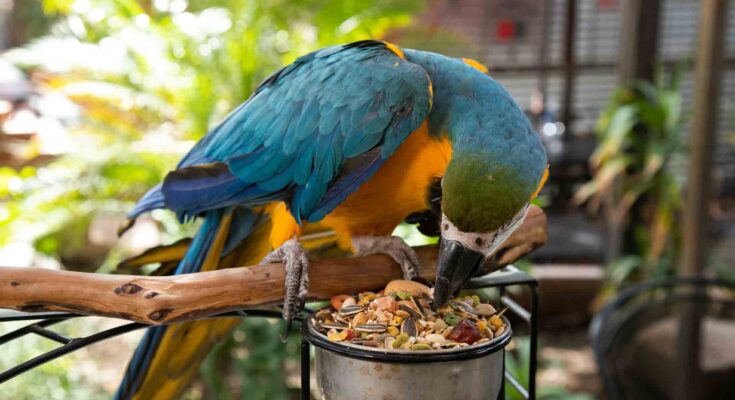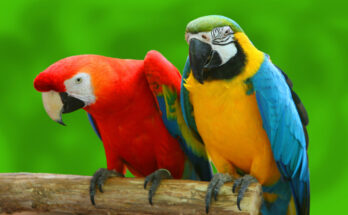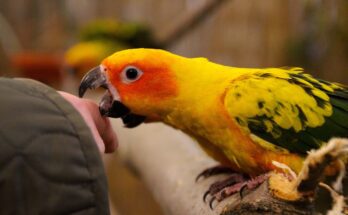Parrots are not just colorful and intelligent birds; they are also sensitive pets that need proper nutrition to stay healthy and happy. A balanced diet plays a key role in your parrot’s overall well-being, including their energy levels, feather health, and even mood.
If you’re a beginner parrot owner, you might feel confused about what to feed your feathered friend. Don’t worry—this guide will give you clear, practical parrot food tips to ensure your bird gets the best possible care.
1. Understanding a Parrot’s Natural Diet
In the wild, parrots eat a variety of foods such as seeds, fruits, nuts, and plants. Their diet changes depending on the region and season. At home, we must mimic their natural eating habits to provide them with balanced nutrition.
- Seeds & Nuts: A favorite for most parrots, but should not be the main food.
- Fruits & Vegetables: Provide essential vitamins and minerals.
- Grains & Legumes: Good sources of protein and fiber.
2. Why a Balanced Diet is Important
Feeding your parrot only seeds or processed food can lead to serious health issues like obesity, liver disease, and feather plucking. A balanced diet ensures:
- Healthy feathers and bright colors.
- Strong immune system.
- Longer lifespan.
- Active and playful behavior.
3. The Best Foods for Parrots
Here’s a list of safe and nutritious foods for your parrot:
Fresh Vegetables
- Carrots
- Broccoli
- Spinach
- Bell peppers
- Sweet potatoes
Fresh Fruits (in moderation due to natural sugars)
- Apples (no seeds)
- Bananas
- Berries
- Mango
- Papaya
Grains & Legumes
- Brown rice
- Quinoa
- Lentils
- Chickpeas
- Oats
Nuts & Seeds (as treats, not daily meals)
- Walnuts
- Almonds (unsalted)
- Sunflower seeds (limited)
- Pumpkin seeds
4. Foods to Avoid for Parrots
Not all human foods are safe for parrots. Some can be toxic and even fatal. Avoid:
- Avocado
- Chocolate
- Caffeine
- Alcohol
- Salty or fried foods
- Onion and garlic
- Fruit seeds (like apple seeds)
5. Parrot Feeding Tips for Beginners
Feeding parrots is not only about giving food—it’s also about creating healthy habits.
- Offer Variety: Rotate vegetables and fruits daily.
- Portion Control: Avoid overfeeding; adjust based on your parrot’s size.
- Clean Bowls: Always provide fresh food and clean dishes.
- Fresh Water: Change drinking water at least twice a day.
- Observe Preferences: Every parrot has favorites—balance treats with nutrition.
6. Pellets vs. Seeds: Which is Better?
Many experts recommend pellet-based diets because they are specially formulated with balanced nutrition. However, parrots also enjoy seeds, and completely removing them may cause stress.
The best approach is a combination diet:
- 60–70% pellets
- 20–30% fresh fruits & vegetables
- 10% seeds, nuts, and treats
7. How to Introduce New Foods to Your Parrot
Parrots can be picky eaters. To encourage healthy eating:
- Introduce one new food at a time.
- Mix new foods with favorites.
- Be patient—sometimes parrots take days to try something new.
- Make food fun—use foraging toys or food puzzles.
8. Common Feeding Mistakes to Avoid
Beginners often make mistakes when feeding parrots. Avoid these:
- Giving too many seeds.
- Feeding only human food scraps.
- Ignoring water hygiene.
- Overfeeding sugary fruits.
- Forgetting about variety.
9. Signs of Good Nutrition in Parrots
A well-fed parrot will show signs of good health:
- Bright, shiny feathers.
- Energetic and playful behavior.
- Clear eyes and beak.
- Healthy weight (not too thin or overweight).
If your parrot shows dull feathers, lack of energy, or unusual droppings, consult an avian vet.
10. Feeding Schedule for Parrots
A daily routine helps parrots feel secure:
- Morning: Fresh fruits and vegetables.
- Afternoon: Pellets and grains.
- Evening: Small portion of seeds or nuts as a treat.
This balance keeps them active and prevents overeating.
Final Thoughts
Caring for your parrot’s diet is one of the most important responsibilities as a bird owner. With the right mix of fresh foods, pellets, and occasional treats, you’ll ensure your parrot lives a long, healthy, and joyful life. Remember—what you feed your parrot directly affects their health and happiness.




